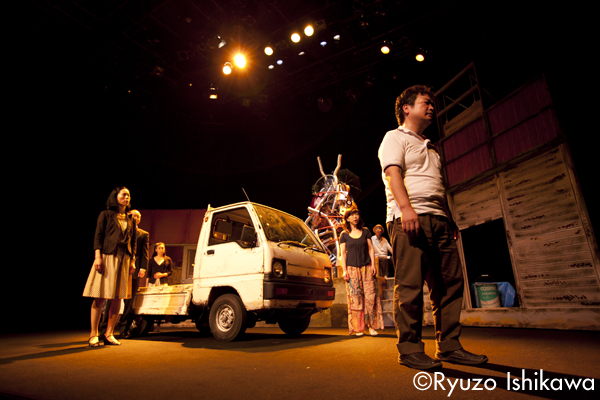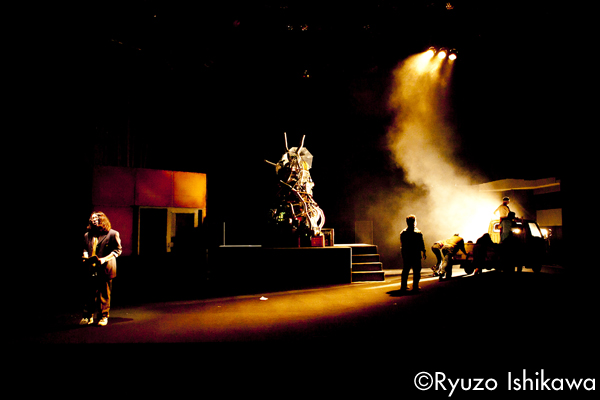As the play opens a light truck has been waved down by a woman on a forestry road somewhere in the hills near the area of East Japan that was struck by the 2011 earthquake and tsunami. The driver of the truck is a man in his forties named Yoshimasa. The woman is a former fellow member of the religious cult that Yoshimasa left more than ten years earlier. In truth, however, the woman is merely an apparition in Yoshimasa’s mind.
In the past, due to the strong will founded in his faith, Yoshimasa had been full of ambition to build toward the future. Now, however, we gather from his conversation with the woman that he is involved in the shady business of trucking out things salvaged from the tsunami-struck areas at night and selling them off to make his living. The woman asks him if he thinks it is right to let his life be dictated by the expediencies of the moment. Hearing this, Yoshimasa drives off as if to escape her words.
The apparition of the woman disappears, only to be replaced soon after by the ghost of Yoshimasa’s late father. To his father, who seems worried by Yoshimasa’s appearance, he explains that he took over the family contracting business after his father’s death but has closed it because of the continuing recession. He also admits that he is still unmarried.
His two younger sisters, Reiko and Mari are also still single. Both are unemployed and living at home with Yoshimasa. The only married one is the eldest daughter, Nobuko. Otherwise, the state of the family is the same as when their father was alive. A deep gloom hangs over Yoshimasa and the family.
The light truck and Yoshimasa return to his home adjoining his small contracting company office and garage in Osaka that has been out of business for some time. From this point on, this garage is the setting for the remainder of the play.
This is the day of the Buddhist memorial service for the 13th anniversary of the father’s death. The eldest daughter, Nobuko, and her husband and son have come for the ceremony. The family’s cousin on the mother’s side has also come for the rites and all are gathered in the house.
Nobuko and her husband come to look around nostalgically at the garage that used to be her father’s workplace. Their son has a Geiger Counter that he got as a present for passing the high school entrance exam, and he is amusing himself by poking around the luggage compartment of the truck taking radiation measurements with it.
When Yoshimasa comes looking for his sister and her husband, a young man he doesn’t know comes out of the truck. He turns out to be a member of the theater company that the youngest daughter Mari is active in. The theater company has been using the garage as a rehearsal studio.
Yoshimasa is annoyed by the know-it-all attitude of the young man as he talks on in a stream supposed logic that leads nowhere. But, in the past, Yoshimasa was probably the same kind of big-headed youth.
The theater group’s next production is going to be a staging of Shakespeare’s
The Tempest
. The young man is to play the role of the monster Caliban. The role of Caliban, as a character awakened to the intellect of civilization when the magician Prospero teaches him language, is also somehow suggestive of Yoshimasa’s past, when he embraced the teachings of the ill-reputed religious cult.
The next person to appear in the garage is a woman who walks with a white cane and has the appearance of a blind masseuse. She says she has come to collect Yoshimasa’s dues. This woman is also a former fellow member of the cult Yoshimasa belonged to. She is now living in hiding, and her supposed blindness is merely a guise.
The “dues” she has come to collect is damages for the incident perpetrated by the cult in the past, and it appears that Yoshimasa has been giving her about the price of a meal each time she comes collecting. When asked for money again, Yoshimasa resists at first, but then the ghost of his father appears, encouraging him to help those in need.
Yoshimasa is called and goes to attend the rites being held for his father’s death anniversary in the adjoining house. Meanwhile, the ghost of his father begins making small talk with the woman with the white cane and his grandson the high school student, who is avoiding going to the rites. The woman lovingly keeps a rabbit, which is a symbol of her faith, and she and the ghost tell the grandson various folk tales about rabbits.
Another member of the theater company comes into the garage; he is the director. The high student is interested in working as a voice actor and he asks the director what the script is that he is holding. The director says it is the script of one of the plays he loves most, Chekhov’s
Uncle Vanya
. He tells the young actor to read it and tell him what he thinks of it.
Yoshimasa returns to the garage after the rites have been performed. After the rites, the eldest daughter, Nobuko, told Yoshimasa that she wants to sell the land that the contracting office and garage are on. Angered by this proposal, Yoshimasa walked out of the house.
The theater company member(s) leave the garage and then Nobuko and the others come in looking for Yoshimasa. Nobuko’s husband has been transferred to another city and the family of three needs money to move there. That is why she wants to sell the contracting company land and divide the money equally between the four siblings. Yoshimasa is still in the process of paying off the debt on money his father borrowed while running the contracting business. If he loses the family home, he won’t be able to continue the work he is doing now. Considering the fact that his two younger sisters are also living there with him, Yoshimasa is worried about what will come of them if they accept the older sister’s sudden proposal.
But, Nobuko reminds him that she is the only one of the four siblings that took care of their parents when they got too old to care for themselves. So, she will not back down on her proposal to sell the land and home. The cousin also joins in support of Nobuko’s plan.
From the way Nobuko and the cousin talk, it appears that the cousin is making arrangements to buy the land, and the basic dealing has already been done. Appalled by his older sister’s audacity at pushing through this decision herself without any consideration for the situations of himself and the two younger sisters, Yoshimasa storms out in anger.
Hearing Yoshimasa say as he leaves, “I am going to die. I’ll die once and then start over,” Nobuko jumps to the conclusion that plans to return to the cult. She rebukes Yoshimasa, saying the reason that Reiko and Mari can’t marry is because he was part of that disreputable cult.
As Yoshimasa prepares to start the engine of his car and drive off, his father’s ghost appears again, standing in front of the car and holding it back. The stage lights fade out amid images of Yoshimasa’s tortured past and the cult’s poison gas incident in the subways.
The scene is the contracting company’s garage several months later.
The young actors of Mari’s theater company are talking. It appears that the performances of
The Tempest
are over. The deal to sell the land has been concluded and this garage that they used for rehearsals will soon be torn down.
The former cult member with the white cane has come to say goodbye to Yoshimasa. Her beloved rabbit that had been the symbol of her faith has died and she has decided to leave the cult’s hideout.
Yoshimasa mutters to the woman with the white cane that what he lost because of the cult was long years of his life. The woman replies that she will give him her magic cane, handing it to him as she leaves.
The actor who has played the part of the high school student recites in monologue some famous lines from the script of the play
Uncle Vanya
that the director had given him. It is the part where Sonya gives encouragement to the disheartened Vanya, beginning with the words, “We must live out our lives. Yes, we shall live, Uncle Vanya …,” and these words sound relevant as an offering to all the people who lost opportunities and hopes they might have had in the era before 1995 and its symbolic Sarin Subway Incident and have never been able to reclaim them in the long years of recession and stagnation ever since.
Holding the white cane, or “magic cane” in his hand, the actor who has played the role of Yoshimasa recites some of the final lines of
The Tempest
spoken by the magician Prospero. Having been banished from his country for indulging in magic, Prospero has now resolved to rid himself of his feelings of vengefulness against the brother who banished him.
“I must be here confined by you, or sent to Naples … But release me from my bands with the help of your good hands … Let your indulgence set me free.”
Much as Prospero appears to leave his fate to the “good hands” of the audience, these ending words seem to leave what will happen next, after this past decade and a half, to the hands of the people in the audience themselves.




